Last week I moderated a discussion at the School of Visual Arts called “Taking Custody: The Double Life of the Artist Mother,” which was organized by Cathleen Cueto, an artist who is expecting her first child this year, and included panelists Suzanne McClelland, Katherine Bernhardt, Rachel Papo, Amy Stein, Renee Cox, and Danica Phelps. I thought readers might like to join the conversation, so here are the introduction and questions we prepared for the discussion. I hope readers will share their experiences and insights in the Comments section. And, yes, anonymous comments are OK.
It occurred to me today that raising a surly teenager sometimes seems like working on a bad painting in the studio: you have faith that if you just keep working on it, you can turn it around, and the struggle will have been worth it. With kids, unlike painting, you don’t have the option of starting again.
Back in the early 1990s Mira Schor and Susan Bee sent a questionnaire to artist mothers asking these questions:
How has being a mother affected people’s response or reaction to your artwork? How has it affected your career? Have you encountered discrimination from other artists, dealers, galleries, art schools, critics because of motherhood or pregnancy? Did you postpone starting your career or stop working when your children were young? How would you describe the differences in treatment of male artists with children or of women artists without children? Did having children enhance your creativity or affect the direction of the work?
I want to thank Mira, Susan, and all the artists who responded to their questions twenty years ago. I suspect that most of the people in this room have read those responses in M/E/A/N/I/N/G, a collection of essays published in 2000.
Today, artists would undoubtedly have some similar responses to their questions, but more notable is that we are asking different questions. Young artists are more concerned with whether raising kids will interfere with their art practice than whether it will lead to discrimination. We no longer fear that kids will ruin our careers — we worry that our careers will ruin our kids.
Questions:
1. After reading Night Studio, Musa Mayer’s moving memoir of growing up with Philip Guston, I was convinced that artists like me, inherently self-centered and often distracted, should not have kids. Ultimately I changed my mind because, as I got older, raising a child seemed like a great adventure. What made you decide that you could do both — have children and a creative career? What age were you when you had kids? Should one have a child while still “emerging” or after one’s career has been better established?
2. Please tell us a little bit about how you managed the day-to-day when your kids were younger. When did you find time to go to the studio? How did your art practice change? Once the kids become teenagers, is life easier or harder? Do you ever feel like you are not succeeding?
3. Divorce can lead to ongoing custody disputes, parental alienation, and other traumatic parenting experiences that are sometimes exacerbated by our non-traditional life choices. Are any of you divorced? Would you say your outlook and choices conflict with societal norms, traditional values, and parenting?
4. Artists value honesty, a trait that can lead to trouble in terms of family relationships, with our parents, siblings and even our own children. Has having children made navigating family relationships more difficult or made it easier? Do you ever feel as though your children, as they get older, don’t understand you?
5. As artists, especially in the early years, we often make choices that privilege studio time over more traditional family-centric financial considerations. How do you pay the bills? How have your financial choices changed since you’ve had children? How have those choices impacted your art practice?
6. Non-artists who have more traditional, high-powered professional careers, such as the women Anne-Marie Slaughter included in her article, are often envious because artists seem to have the freedom to set our own schedules. At the same time, since we are not as well compensated for our work (if at all), and sometimes we work at home, and are judged harshly for putting our art practices first, particularly by our children. Let me ask: have some of you encountered hostility as a result of making what others consider selfish choices? How have you managed that hostility?
7. Are work/family dilemmas primarily an issue for women? Do you perceive a vast difference between men and women in the art world? Earning power? Exposure? Have you ever felt discriminated against for having children in terms of not being taken as seriously as women/male artists who are single?
8. In “Neo-Maternalism,” a 2009 article in The Brooklyn Rail, I suggested that, with the rise of relational aesthetics, child-rearing itself could become the substance of artists’ practice, and, in fact, last year, Marni Kotek produced a performance piece in which she gave birth to her baby at Microscope Gallery in Brooklyn. What are your thoughts, as a parent, about using kids in your art practice? Was Larry Rivers out of line to videotape his daughters naked, or is everything fair game for an artist? If you have used your kids in your practice, perhaps you could share your experience.
Related: Alyssa Pelish reported on the discussion for On The Issues Magazine: Taking Custody: Owning the Role of Artist AND Mother
———
UPDATE (November 16, 2012) SVA recently posted a video of the discussion in it’s entirety. Check it out. Running time 1:33:12
——-
Subscribe to Two Coats of Paint by email.


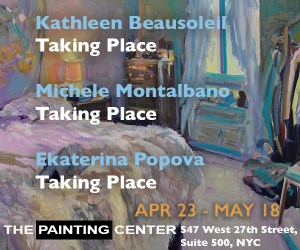

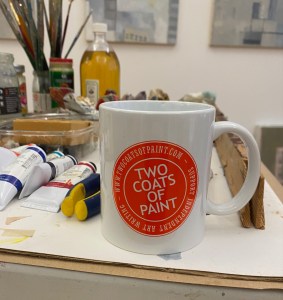
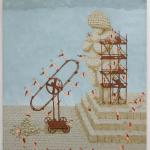


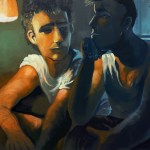
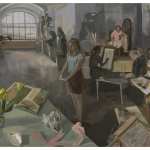
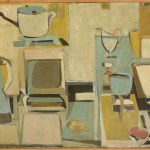
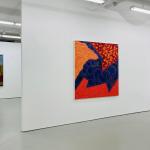

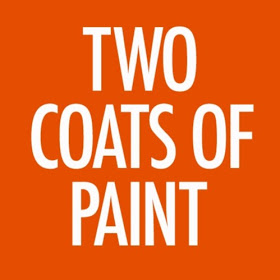

I wonder if we don't all secretly believe that we can have it all: career, family, romantic connection, & economic security. It has been healthy for me to accept that I cannot be all things to everyone at all times (including myself). There seems to be a perception in our culture that if we can't do it all, and do it well, then we are somehow less than.
There was the recent movie "I Don't Know How She Does it' w/ Sarah Jessica Parker, I only saw a trailer but that was enough to feel revulsion.
After having my first baby, (one year ago this November) I went through an emotional and psychological upheaval. My perfectionism quickly became counterproductive and at times destructive. Additionally I struggled (and still do, although to a lesser extent) with the loneliness, tedium and quantity of selfless activity. The saving grace has been a gradual acceptance of my feelings of vulnerability. My work has a new sensitivity & openness. I am constantly learning as opposed to knowing anything and I've thankfully rescinded the arrogant notion that I could and should "do it all".
Prior to agreeing to make a baby, my husband and I made the decision to move to Alabama where he practices law for a non-profit civil rights organization and I can focus on my studio practice thanks to the low cost of living & lack of distraction. Unless my husband chose to work at a law firm, or I made a living on my work, a metropolitan life and a baby wouldn't be possible. Its important to both of us that he be as engaged with his work as I am with mine, so the firm route was not seriously considered. Living remotely is a career risk for me, although I am thankful to say that so far I have still be able to garner exhibition opportunities. I miss the ability to see exhibitions and studios of friends and colleagues, but for now I have a life that I can manage and, most importantly, enjoy.
I wonder if we don't all secretly believe that we can have it all: career, family, romantic connection, & economic security. It has been healthy for me to accept that I cannot be all things to everyone at all times (including myself). There seems to be a perception in our culture that if we can't do it all, and do it well, then we are somehow less than.
There was the recent movie "I Don't Know How She Does it' w/ Sarah Jessica Parker, I only saw a trailer but that was enough to feel revulsion.
After having my first baby, (one year ago this November) I went through an emotional and psychological upheaval. My perfectionism quickly became counterproductive and at times destructive. Additionally I struggled (and still do, although to a lesser extent) with the loneliness, tedium and quantity of selfless activity. The saving grace has been a gradual acceptance of my feelings of vulnerability. My work has a new sensitivity & openness. I am constantly learning as opposed to knowing anything and I've thankfully rescinded the arrogant notion that I could and should "do it all".
Prior to agreeing to make a baby, my husband and I made the decision to move to Alabama where he practices law for a non-profit civil rights organization and I can focus on my studio practice thanks to the low cost of living & lack of distraction. Unless my husband chose to work at a law firm, or I made a living on my work, a metropolitan life and a baby wouldn't be possible. Its important to both of us that he be as engaged with his work as I am with mine, so the firm route was not seriously considered. Living remotely is a career risk for me, although I am thankful to say that so far I have still be able to garner exhibition opportunities. I miss the ability to see exhibitions and studios of friends and colleagues, but for now I have a life that I can manage and, most importantly, enjoy.
My male mate did as many diapers, bottle feedings, doctors appt.'s, ER runs, food shopping, etc., if not more, so I'm thinking the whole here lacks dimension. Having kids and art was never about 'having it all' . Painting is a way of life, it's about being a representer so others can see, there was no 'kids' and 'painting', it was organic and seamless. We don't know why we had kids, three, and no way would we do it differently, if you have the urgency to paint and something to say, it will come out. I never needed the perfect studio or time since images appear in my head and they come out like babies being born between swim practise and picking up prescriptions.
This is such an important discussion – and touches on issues that many non-parents in the arts aren't even aware of. I'd like to share this video and a link to your post on http://www.culturalreproducers.org, a resource I recently started for artist-parents!
Thanks Christa. I'll be participating in a panel discussion on artist mothers in Chicago, February 2-14, at the College Art Association annual conference.We'll be discussing how issues surrounding motherhood have changed since Mira Schor and Susan Bee originally edited the motherhood issue of M/E/E/A/N/I/N/G. I'll post details soon.
–Sharon